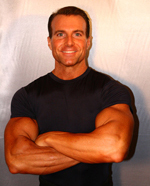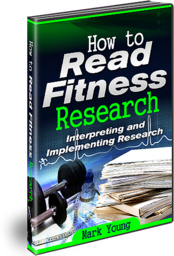I think we can all agree that when it comes to your training and nutrition programs, results in the real world are what count… So why should you care about what the research world says? Why not just hit the gym and keep doing more of whatever is working? Simple answer: You SHOULD keep doing what’s working for you! But…. If you don’t even have a basic understanding of how fitness research works, at best, you’ll have no idea HOW you got your results… and at worst, you’ll be doomed to a life of being confused, feeling conflicted and getting ripped off by fitness marketing hype. Read on for part 2 of my fitness research interview with Mark Young and discover the shortcuts that will protect you from being a victim of fitness scams and allow you to think for yourself in today’s confusing diet and exercise world…
How To Read Fitness Research: Interview with Mark Young, Part 2
Continued From Part One
Tom: Mark, you’ve said that one of the reasons you do the work you do is because you got sick of all the dubious marketing claims for fitness supplements, programs and products. But in some cases, its manipulation or cherry picking of research that actually allows individuals and companies to market their bogus products more effectively. Let’s assume that the average person doesn’t have the time or the inclination to look up all those studies to verify whether they even support the claims. Are there any dead giveaways in the marketing or advertising materials that might help tip someone off that a product is best avoided based on advertising claims alone, without expecting a busy person to actually go and read all the research?
Mark: I’ll be honest up front and say that I think that what we do with our time is all about prioritization. If you’re thinking about taking a new supplement, for example, I think it deserves enough priority to warrant making time to read research and being very clear about its usefulness as it can possibly affect your health, physique, and your wallet. To me, this is more important than watching reality TV or playing Xbox so I prioritize accordingly.
That said, if the results promised by a product seem too good to be true they probably are. In terms of fat loss, we have yet to produce a legal drug that results in a weight loss that is greater than 5% of body weight so any supplement that makes greater claims than that should raise a red flag. If we can’t make a drug that does it safely, supplements probably aren’t going to do it either.
For muscle gain, if a supplement promises steroid like results, it is probably a load of crap. I’ve been in the industry a long time and if there were such a supplement and it were safe, I’d be on it…and so would every evidence based professional. As a general rule, I like to wait and watch to see if a supplement stands the test of time. If people aren’t still talking about it a year or more from the date it was released it probably isn’t worth buying. If you look at creatine…people are still talking and it is one of the few supplements that has lasted.
Again, these are standards to use if you’re not going to read the research. I don’t suggest this practice, but I respect that not everyone will read research and that’s cool. Just beware of big claims. They’re usually false.
Tom: Most people don’t believe me at first when I tell them there’s a book called, how to lie with statistics until they actually go to amazon and see that it really exists. You seem to have an excellent grasp on statistics – it’s part of your program – and it seems to me that one way for the average person to put statistics to practical use is to understand how advertisers might manipulate statistics in order to sell their fat burning or muscle building supplements. Im sure our readers have seen ads that say “mega muscle 5000 builds 9457% more mass than placebo!” and that looks a little suspect, but what else should people watch out for with the use of statistics in advertising that should set off their BS detectors?
Mark: When advertisers present their results as percentages I’m always a little leery. For example, a person taking supplement 200% more fat than the placebo group seems like a reasonable statement. But it all falls apart when you consider that the group taking the supplement lost 2 pounds versus the 1 pound lost in the placebo group over a period of 16 weeks. Of course, you’re not going to see many advertisers talking about actual numbers, but even if you pull up an abstract you can usually get this information quickly.
Advertisers often use graphs as well to illustrate differences between groups so it is important to look at the scale on the graph to see if the differences are as large as they appear. A bar graph of a 2 pound versus a 1 pound loss will make it look convincingly as though one is far superior to the other unless you look at the numbers.
This also brings to mind the notion that there is a big difference between statistical significance and clinical significance. There may be a statistical difference between two groups, but that difference may not translate into any meaningful difference in the real world. If the ad you’re reading talks about one method being statistically significantly better and there are no actual numbers to support that claim, you’d best look up the study to figure out what those numbers are and if they’re worth paying money for. Similar to the above, the differences may be small and useless in the big picture.
Tom: What would you do if you wanted to make a decision on buying a supplement, and there’s a large body of research on the subject, but it’s split right down the middle? Half the studies say it works, half the studies say it doesn’t work?
Mark: Having a pretty solid knowledge of the history of supplements, I probably wouldn’t bother with it until the research was more conclusive. Very few supplements have ever really panned out to be the great body composition panacea that people have expected them to be in the beginning.
It also helps to have a clear definition of the word “work” in this context because research on stuff like fish oil is still spilt in terms of its effects on fat loss, but some studies are starting to show potential effects on muscle mass and its role in cardiovascular health is pretty accepted. In the case of fish oil, I would say that it likely “works” for cardiovascular health and maybe for muscle gain and fat loss.
Despite the fact that it may or may not “work” for some things, it will likely provide benefits in terms of other things so I would consider using something like this as the risk to benefit ratio is pretty low. At the very least, you know you’re going to get something positive out of it. If there is no definite positive, I wait it out.
Tom: A lot of mainstream diet books have a bibliography at the end with references numbering into the hundreds or even topping a thousand. Obviously, almost nobody is going to check all the references, even though a program like yours can teach them how if they want to, but the average person finishes the book with a sense that that book must be legitimate. In reality, all the references may be cherry picked and the entire book is a textbook study on confirmation bias if not a willful effort to deceive to sell something. Any thoughts on this conundrum? Is the average diet book reader just screwed or can the kind of information you’re teaching really help people with this?
Mark: Great question!
And I definitely believe that what I’m teaching can be of help. If time is a concern then just pulling a current review paper (a research paper detailing the all of the relevant research on the subject) can sometimes provide a more balanced viewpoint than is provided in a typical diet book. A good review will include research that both supports and refutes a theory and this would be a good place for someone new to the area to get up to speed.
If someone wants to dig a little deeper they could pull some of the most current studies from a search on PubMed as well to see if the most recent research is in line with the theories presented in the book (remembering that there is often a couple years of lag time between research and mainstream publication).
It isn’t totally comprehensive, but this method is a quick way to get a more objective viewpoint.
Tom: Let’s assume that some folks are just so sick of being lied to and misled by all these diet books or supplement scams or they’re simply tired of being given poorly researched information that they want to take matters into their own hands and start fact checking for themselves. One thing your program teaches is how to use pub med to look up studies, which is the main resource I use myself. Our readers can get detailed info from your research course, but could you give us a super quick pub med 101?
Mark: Sure. Assuming you’re just getting started reading research and you want a broad overview of a specific topic for free (most articles cost money otherwise), here’s what you’d do.
– Step 1: Go to PubMed at www.PubMed.gov.
– Step 2: Click on the word “Limits” just above the search bar at the top of the page.
– Step 3: In the section on the top left where it says “Type of Article” click the check box beside the word “Review”
– Step 4: In the section on the bottom left where it says “Text Options” click the check box beside “Links to free full text”.
– Step 5: Type the key word of the subject you want to look up (such as muscle hypertrophy) in the search bar and hit search.
You should now have at least a few full text reviews on the topic of your choosing for free. I should also say that knowing which keywords to use is a bit of an art and it takes practice. Keep trying different combinations (Note – “Getting Hyooge” is not a good keyword) and you’ll eventually come up with with you’re looking for.
Tom: I remember the first time I tried to search for something on pub med and I couldn’t find anything, just a random mass of unrelated study abstracts. But then I figured out just a few simple short cuts that let me find anything I wanted almost instantly. What are some of your favorite shortcuts for finding research papers that are directly relevant to an area you’re interested in?
Mark: Frankly, the area I’m most interested in is protein metabolism and hypertrophy so my favorite shortcut that leads me to the most valuable information is to remove the limits and just look for authors who are leaders in this field. By doing this you can quickly come up with a lot of very relevant abstracts.
For example, a quick search for Phillips SM, Tipton KD, or Rennie MJ will net you a whole boatload of stuff on muscle protein synthesis and muscle growth. Of course, this is a pet area for me so I obviously know the names in the area. As you get to know the field (or look at the references in a review paper) you’ll get to know who the major players are and you can look them up too.
Tom: You’re an advocate of teaching people to think for themselves. But everywhere I look, I see herd mentality. Its flat-out human nature to want to belong to a group and the way I see it, the diet and fitness industries are downright tribal, in fact they are downright religious. How specifically, do you propose that people use research to start thinking for themselves when it seems like they’re more influenced by other people in the herd than they are by the facts?
Mark: I think the best way to start using research is to take a look at your most entrenched beliefs about fitness and look them up. At one point I’d bought in to the industry dogma that static stretching before exercise impeded performance…so I looked it up.
As it turns out, stretching does impede performance, but if you do dynamic mobility work afterward that negative effect actually seems to disappear. So I learned that you don’t have to remove static stretching pre-workout, but you do have to follow it with dynamic work leading in to a workout.
And if you find your belief confirmed you can go forward with that method until research demonstrates otherwise. To take it a step further, if you read blogs and you discover that information from a specific source is often refuted or incomplete you might be able to eliminate that type of misleading material from your reading list.
Tom: Another place that research gets misused and misinterpreted is in the mass media. My experience is that most journalists really do want to do a good job, but they’re under deadline pressure and tremendous pressure to create a story with a hook and they simply don’t have the background to make accurate interpretation of research so they make a lot of mistakes in their stories. I figure that all journalists ought to be forced to watch your videos before writing a story on fitness research, but until that happens, what advice can you can offer people for reading mass media reporting of scientific studies?
Mark: Absolutely. This is the same advice I give to people when they hear about a study through other means…and that is to find the study they’re talking about and read it for themselves.
I know I’m probably getting a little repetitive in this regard, but there is simply no replacement for reading a study for yourself. Otherwise you are subject to the interpretations of the person reading it AND the interpretations of the person writing it (researchers have biases too).
Of course, you could see if someone you trust (like Tom) has reviewed it, but in this case I still like to read things for myself. Sometimes I have a differenct perspective from the authors or those that have reviewed it because of other things I’ve read or my experiences.
If you’re making a quick decision though, you need to ask yourself who the study was done on (Rats? Humans? Old? Young? Diabetic? Healthy?) and numerous other questions before you even begin to accept that information.
Tom: I got really serious about research around 2004 or 2005 when I went full time as a writer and online publisher, and since then I’ve read thousands of studies. But even with my experience reading research, I learned a lot of things from your program I didn’t know and I thought it was an excellent course. My question is, who should buy this product? I would recommend your fitness research program to any trainer, any nutrition professional or anyone who works in the fitness industry and anyone with any kind of personal interest in scientific research, but do you think your program will appeal to the average Joe and help consumers to hone up their BS detectors so they don’t fall for all these crazy ad claims or to pick apart media stories and so on?
Mark: I think that any fitness professional who does not currently read research or a does not have a strong educational background in research design and statistics could benefit by checking out this product. Reading research can differentiate a fitness professional from the rest of the industry and their competition by making them stand out like a beacon of truth in the sea of confusion. Those also seeking referrals to their business from physicians and other health providers will also find themselves and their opinions more valued when they are backed by science. And above all, having a sound understanding of what truly matters will help fitness pros bring about the best results for their clients and themselves.
As for the average Joe, I definitely think this product can help them to not only pick apart what is presented in the media and in the mainstream fitness industry, but to determine who in the mainstream industry is worth listening to in the first place.
I also feel that those with a good handle on research won’t be gambling with their money, their physiques, and their health every time a new fitness trend comes along. Instead, they’ll be able to make solid decisions and keep themselves on the optimal path to health and looking fantastic!
Tom: Mark I could actually go on and on, because I really enjoy this topic and I appreciate the work you do, but I think we’ll wrap it up here for now. Maybe we’ll do an encore about something research-related in the future. Until then could you give leave us with all your contact info – definitely mention your blog – and tell everyone where they can get the info about “How to Read Fitness Research”
Mark: Thanks for the opportunity to do this interview Tom! I really enjoyed it.
Please feel free to check out my blog at: www.MarkYoungTrainingSystems.com for some evidence based info on training, diet, obesity, and other fun stuff. And for those interested, you can get more information on my product How to Read Fitness Research at www.HowToReadFitnessResearch.com
Tom. Thanks Mark!
The “How to Read Fitness Research” (HTRFR) program is highly recommended for personal trainers, strength coaches, dieticians and anyone who is interested in nutrition or exercise science. It’s also invaluable for consumers for avoiding fitness scams, cutting through information overload and fact checking articles, advertisements or news stories for accuracy. The program is almost 40% off now through this Friday for Burn the Fat Blog readers. For more information, visit Mark’s website at: HowToReadFitnessResearch.com. (Note: Burn the Fat blog is an affiliate of HTRFR).
Copyright BurnTheFatBlog.com Do NOT copy. Unauthorized reproduction is prohibited.
About Mark Young

About Tom Venuto








[…] 3. Recently the legendary Tom Venuto asked me to do an interview for his site and it turned out to be a monster. In fact, it was so long it ended up being a two part interview and I honestly believe it is one of the best I’ve done on the topic of research and its application to fitness, fat loss, muscle gain, and performance. You can check out part one HERE and part two HERE. […]
BOTH OF YOU HIT THE “MARK” WITH THE ABOVE INTERVIEW!*I LOVE THE FACT THAT MARK POINTS OUT HOW LUCKY WE ALL ARE TO HAVE SOMEONE LIKE SIR TOM VENUTO BE ABLE TO ANALYZE THIS TYPE OF RESEARCH AND IN ADDITION TO THAT,GO OUT OF HIS WAY TO INFORM THE REST OF US …IN A “LANGUAGE” WE CAN ALL UNDERSTAND!(:I AM VERY GRATEFUL THAT MARK WAS GENEROUS ENOUGH TO PROVIDE US WITH THE ABOVE MENTIONED INFORMATION ON THE RESEARCH SITES.THE SCIENTIFIC AND RESEARCH DATA IS EXTREMELY IMPORTANT AND I PRAY THAT FELLOW READERS DO NOT TAKE THEIR INFORMATION LIGHTLY.(:PEAS..I MEAN PEACE!*TO THE BOTH OF THESE GENTLEMEN..(: -KARINA
Tom is one of the few really solidly evidence based guys out there and we are all very fortunate to have him around for sure. His blog is one of the select few that I can recommend with confidence.
Thank you Tom for providing us with part 2 of your interview! It was very enlightening and once again underscores the importance for each individual to do their own research in order to ensure optimal health and body composition. Ultimately the bucks stops with us the readers, and if we aren’t willing to investigate some of the outlandish claims made by people in the fitness industry, then we deserve whatever we get.
I will be sure to do my own “due diligence” in the future when making decisions about my body and health instead of just allowing myself to be spoon fed information. Having somebody like you Tom, who is credible, certainly helps in sifting through the spurious claims made by various people in the industry, but I still think each person should be willing to review the scientific literature on their own.
I just bookmarked the PubMed web page so that is where I will be turning in the future to do my own research. If you know of any other worthwhile sources of information please share!
Scott – PubMed is virtually limitless in that you can search almost anything there and start to acquire information for yourself. Once you get started (and get used to reading papers – which admittedly takes a while) you’ll be addicted. :)
KOOL! (: *NOW WE CAN ALL DO OUR “HOMEWORK”!(:
Finally! Someone whose taken the time to research these shady characters. Thank you!
Ultimately the bucks stops with us the readers, and if we aren’t willing to investigate some of the outlandish claims made by people in the fitness industry, then we deserve whatever we get.
If you know of any other worthwhile sources of information please share!
We often buy needlessly without reading. I hope this opened everyone else’s eyes as much as it did for me.